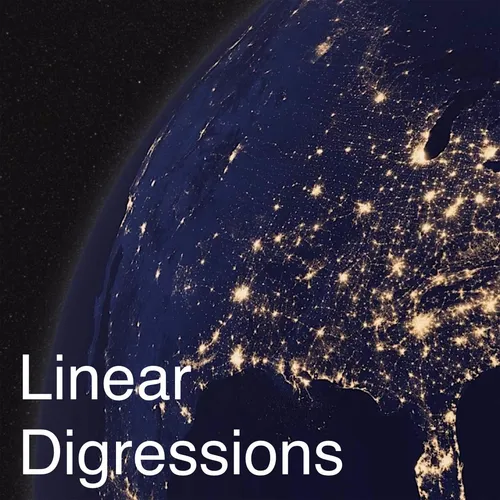
Linear Digressions
In each episode, your hosts explore machine learning and data science through interesting (and often very unusual) applications.
- Update frequency
- every 6 days
- Average duration
- 19 minutes
- Episodes
- 291
- Years Active
- 2014 - 2020

Rock the ROC Curve
This week: everybody's favorite WWII-era classifier metric! But it's not just for winning wars, it's a fantastic go-to metric for all your classifier quality needs.
00:15:52 |
Mon 30 Jan 2017

Ensemble Algorithms
If one machine learning model is good, are two models better? In a lot of cases, the answer is yes. If you build many ok models, and then bring them all together and use them in combination to make…
00:13:08 |
Mon 23 Jan 2017

How to evaluate a translation: BLEU scores
As anyone who's encountered a badly translated text could tell you, not all translations are created equal. Some translations are smooth, fluent and sound like a poet wrote them; some are jerky, non…
00:17:06 |
Mon 16 Jan 2017

Zero Shot Translation
Take Google-size data, the flexibility of a neural net, and all (well, most) of the languages of the world, and what you end up with is a pile of surprises. This episode is about some interesting fe…
00:25:32 |
Mon 09 Jan 2017

Google Neural Machine Translation
Recently, Google swapped out the backend for Google Translate, moving from a statistical phrase-based method to a recurrent neural network. This marks a big change in methodology: the tried-and-true…
00:18:12 |
Mon 02 Jan 2017

Data and the Future of Medicine : Interview with Precision Medicine Initiative researcher Matt Might
Today we are delighted to bring you an interview with Matt Might, computer scientist and medical researcher extraordinaire and architect of President Obama's Precision Medicine Initiative. As the Ob…
00:34:54 |
Mon 26 Dec 2016

Special Crossover Episode: Partially Derivative interview with White House Data Scientist DJ Patil
We have the pleasure of bringing you a very special crossover episode this week: our friends at Partially Derivative (another great podcast about data science, you should check it out) recently inter…
00:46:09 |
Sun 18 Dec 2016

How to Lose at Kaggle
Competing in a machine learning competition on Kaggle is a kind of rite of passage for data scientists. Losing unexpectedly at the very end of the contest is also something that a lot of us have exp…
00:17:16 |
Mon 12 Dec 2016

Attacking Discrimination in Machine Learning
Imagine there's an important decision to be made about someone, like a bank deciding whether to extend a loan, or a school deciding to admit a student--unfortunately, we're all too aware that discrim…
00:23:20 |
Mon 05 Dec 2016

Recurrent Neural Nets
This week, we're doing a crash course in recurrent neural networks--what the structural pieces are that make a neural net recurrent, how that structure helps RNNs solve certain time series problems, …
00:12:36 |
Mon 28 Nov 2016

Stealing a PIN with signal processing and machine learning
Want another reason to be paranoid when using the free coffee shop wifi? Allow us to introduce WindTalker, a system that cleverly combines a dose of signal processing with a dash of machine learning…
00:16:55 |
Mon 21 Nov 2016

Neural Net Cryptography
Cryptography used to be the domain of information theorists and spies. There's a new player now: neural networks. Given the task of communicating securely, neural networks are inventing new encrypt…
00:16:16 |
Mon 14 Nov 2016

Deep Blue
In 1997, Deep Blue was the IBM algorithm/computer that did what no one, at the time, though possible: it beat the world's best chess player. It turns out, though, that one of the most important move…
00:20:05 |
Mon 07 Nov 2016

Organizing Google's Datasets
If you're a data scientist, there's a good chance you're used to working with a lot of data. But there's a lot of data, and then there's Google-scale amounts of data. Keeping all that data organize…
00:15:00 |
Mon 31 Oct 2016

Fighting Cancer with Data Science: Followup
A few months ago, Katie started on a project for the Vice President's Cancer Moonshot surrounding how data can be used to better fight cancer. The project is all wrapped up now, so we wanted to tell…
00:25:48 |
Mon 24 Oct 2016

The 19-year-old determining the US election
Sick of the presidential election yet? We are too, but there's still almost a month to go, so let's just embrace it together. This week, we'll talk about one of the presidential polls, which has be…
00:12:28 |
Mon 17 Oct 2016

How to Steal a Model
What does it mean to steal a model? It means someone (the thief, presumably) can re-create the predictions of the model without having access to the algorithm itself, or the training data. Sound fa…
00:13:36 |
Sun 09 Oct 2016

Regularization
Lots of data is usually seen as a good thing. And it is a good thing--except when it's not. In a lot of fields, a problem arises when you have many, many features, especially if there's a somewhat …
00:17:27 |
Mon 03 Oct 2016

The Cold Start Problem
You might sometimes find that it's hard to get started doing something, but once you're going, it gets easier. Turns out machine learning algorithms, and especially recommendation engines, feel the …
00:15:37 |
Mon 26 Sep 2016

Open Source Software for Data Science
If you work in tech, software or data science, there's an excellent chance you use tools that are built upon open source software. This is software that's built and distributed not for a profit, but…
00:20:05 |
Mon 19 Sep 2016
Disclaimer: The podcast and artwork embedded on this page are the property of Ben Jaffe and Katie Malone ([email protected]). This content is not affiliated with or endorsed by eachpod.com.